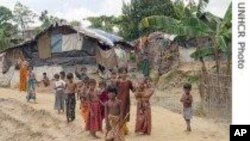Burma's Rohingya Muslims continue to suffer at the hands of the military regime. As part of their campaign to Burmanize the Rohingyas, the Burmese government restricts the practice of Islam and pressures the Rohingyas to convert to Buddhism. Burmese authorities sometimes prevent publication and distribution of the Koran and make Rohingya participation in the hajj [pilgrimage to Mecca] difficult. Mosques have been closed or even destroyed by the Burmese regime. Authorities frequently force Muslims to build Buddhist shrines and pagodas.
<!-- IMAGE -->The Rohingya have lived in the Northern Rakhine State for hundreds of years. Yet Burma's military rulers claim the Rohingya did not live in the region prior to British colonial rule and thus are not eligible for Burmese citizenship. Without citizenship or Buddhist affiliation, Rohingya are discriminated against in education, employment, health care, and in the exercise of such basic rights as marriage and the registration of births and deaths.
Approximately eight-hundred thousand Rohingya live in Burma. In the early 1990s, Bangladesh forcibly repatriated to Burma some two-hundred-fifty thousand Rohingya refugees. According to the Office of the United Nations High Commissioner for Refugees for Malaysia, there are over twelve-thousand Rohingya refugees in Malaysia, and the actual number may be higher.
<!-- IMAGE -->The U.S. State Department human rights report says even more serious abuses, including reported killings, beatings, torture, forced labor. . .and rape are committed by Burmese security forces against the Burmese people, including the Rohingya and other ethnic minorities.
In an effort to help the Rohingya, the United Nations is establishing a program to issue identification cards that will ease registration of births and marriages, school enrollment, and access to basic health care. U.S. and U-N officials hope the cards will help the Rohingyas assert their claim to Burmese citizenship. In a country where documents and permission papers are so important, having an I-D card is vital, said U-N High Commissioner for Refugees in Burma Marc Rapoport.
U.S. Under Secretary of State for Political Affairs Nicholas Burns said, The world must not turn its back on the people of Burma and allow the regime's disregard for human dignity to continue.




